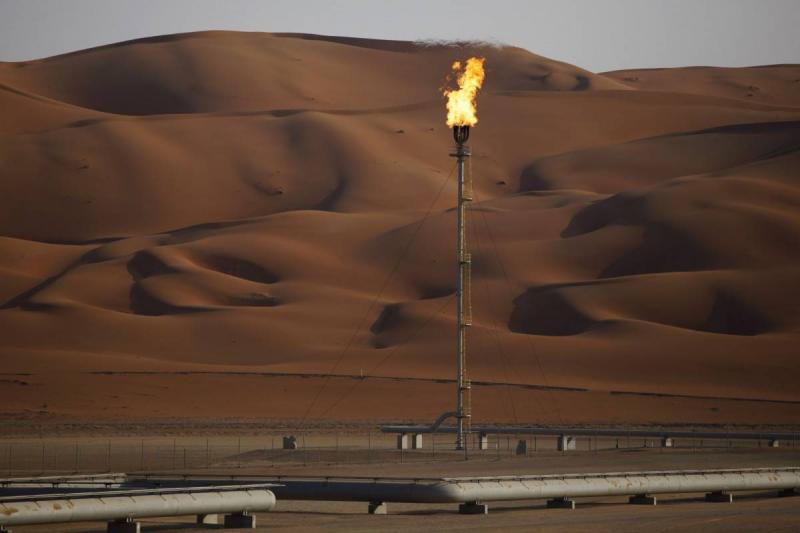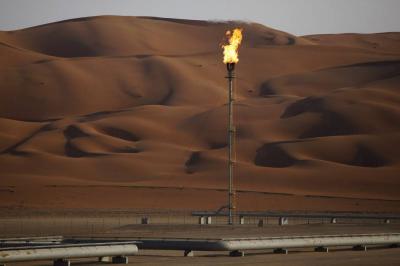Under the title "Gulf Countries Sell Oil Assets 'Crown Jewels' to Raise Billions of Dollars," a Bloomberg report highlighted the increasing trend of oil-rich nations in the Middle East selling stakes in energy companies described as "crown jewels" to attract cash liquidity from foreign investors. In just a few weeks, Saudi Arabia, the UAE, Qatar, Oman, and Kuwait accelerated multi-billion-dollar plans to divest energy assets or issue bonds backed by them.
In the latest move in this direction, Saudi Crown Prince Mohammed bin Salman announced last Tuesday that the Kingdom is in talks with an unspecified "global energy company" to sell a stake valued at around $20 billion in the state-owned oil giant Aramco.
#### Enhancing Damaged Financial Resources
This shift underscores how countries in the region, which holds nearly half of the world's oil reserves, are capitalizing on the recovery in energy prices following the downturn triggered by the COVID-19 pandemic in 2020 to bolster their compromised financial resources. The global transition towards cleaner and more environmentally friendly energy sources increases the necessity to sell stakes in energy companies, as governments require new cash liquidity to invest in new sectors and diversify their economies.
Investors, burdened by historically low-interest rates, are seizing this opportunity. Justin Alexander, Chief Economist at MENA Advisors in the UK, stated, "It makes sense for these countries to sell stakes when valuations are good... Selling some stakes for financial reasons... and some as an increasing acknowledgment of the rapid transformation in the energy sector and the need to realize value from those assets."
#### Rising Budget Deficits in the Region
Middle Eastern oil-exporting countries witnessed a rise in budget deficits to 10.8% of GDP in 2020, up from just 3%, according to the International Monetary Fund. The GDP of Saudi Arabia, the UAE, and Qatar contracted at the largest rate in nearly 30 years.
#### Aramco and ADNOC
Saudi Aramco, the world's largest oil company, and the Abu Dhabi National Oil Company (ADNOC), which is responsible for nearly all oil and gas production in the UAE, have been the most active state-owned companies in the region. Both companies began moving towards privatization before the COVID-19 pandemic, with Aramco listing 1.5% of its shares on the Saudi stock market in 2019, and ADNOC selling a stake in ADNOC Distribution in late 2017 through an initial public offering.
Since then, the pace of deals in terms of volume and expertise has accelerated, with increased emphasis on attracting foreign funds. On April 10, 2021, Saudi Aramco announced it had signed an agreement to sell a 49% stake in the newly established subsidiary "Aramco Oil Supply Company" to EIG Global Energy Partners, for $12.4 billion. The next potential deal for Aramco could involve selling a stake in its natural gas pipelines, aiming to attract more international investors to the Kingdom. ADNOC, for its part, plans to complete an initial public offering for its drilling and fertilizer units.
These offerings or sales follow a series of transactions since June 2020, which have seen firms like Brookfield Asset Management and Apollo Global Management invest around $15 billion in ADNOC’s pipelines and real estate.
Crown Prince Mohammed bin Salman sees Aramco as a key component of his Vision 2030 initiative, which aims to enhance all sectors, including tourism and investment in solar energy and pharmaceuticals. Sheikh Mohammed bin Zayed, the Crown Prince of Abu Dhabi, has similar visions for ADNOC, having recently increased his control over the company to extract more funds from its assets.
#### Maintaining Control
Amidst this flurry of activity, companies are keen on structuring transactions in ways that do not relinquish control over key assets; when subsidiaries are sold, they maintain a majority stake in them. In pipeline deals, Aramco and ADNOC have offered leasing rights instead of direct ownership rights. U.S. investment bank Moelis & Co is advising both Aramco and ADNOC in crafting strategies to sell stakes in some of their subsidiaries.
Ben Cahill, senior fellow at the Center for Strategic and International Studies in Washington, remarked, "Gulf oil companies have realized that they can sell parts of their empire and raise funds without losing control... for companies and governments, this is a very good mix."
In other parts of the Gulf, Qatar Petroleum and Omani state-owned companies, such as the state energy firm OQ, plan to take advantage of the international dollar-denominated bond market for the first time. OQ is an integrated energy company involved in oil and gas exploration and production, refinery management, a retail network, and large petrochemical operations. The company was formed from the merger of Oman Oil Company with several others, including state-owned Oman Gas Company, Orpic (the refining group), and Oxea (the chemical producer).
Qatar Petroleum seeks to issue $10 billion in international bonds to increase its liquefied natural gas export capacity. In the past, a country like Qatar, which has the highest per capita income globally, could issue bonds for $29 billion to enhance its LNG export capacity. Fitch Ratings reported on Monday that the Qatari government is trying to reduce the debt burden that surged in 2020.
#### Omani Approach
On Wednesday, Oman Oil Company decided to issue international bonds worth $500 million for a term of seven years. The state oil development company may later issue $3 billion in international bonds within 2021. These bond issuance plans come as part of a broader restructuring of the oil sector since Sultan Haitham bin Tariq came to power just over a year ago, as he sought to find ways to attract foreign financing and rejuvenate the strained economy.
Meanwhile, the state-owned Kuwait Petroleum Corporation is considering issuing its first international bonds as part of a strategy to raise as much as $20 billion over the next five years to offset anticipated revenue shortfalls.
#### More Upcoming Deals
Asset sales and debt issuance are likely to constitute the lion's share of future transactions, according to Hassanein Malik, head of equity research at Tellimer, a London-based firm providing analyses of emerging markets. Malik, who has tracked developments in Middle Eastern markets for over 20 years, said, "It seems that securing future cash flows, issuing bonds, as well as private equity sales, is a less strenuous way to gather financing from international investors compared to selling equity through an IPO."
He added that Gulf oil companies "are fully aware that the base of fixed-income and private equity investors is larger than that of regional equities." Currently, foreign investors, who seldom had such a range of options to invest their money in the Middle East's oil and gas sector, are eager to invest. Ben Cahill mentioned, "There are definitely more offerings on the horizon... national oil companies are watching each other and adopting some new approaches."




